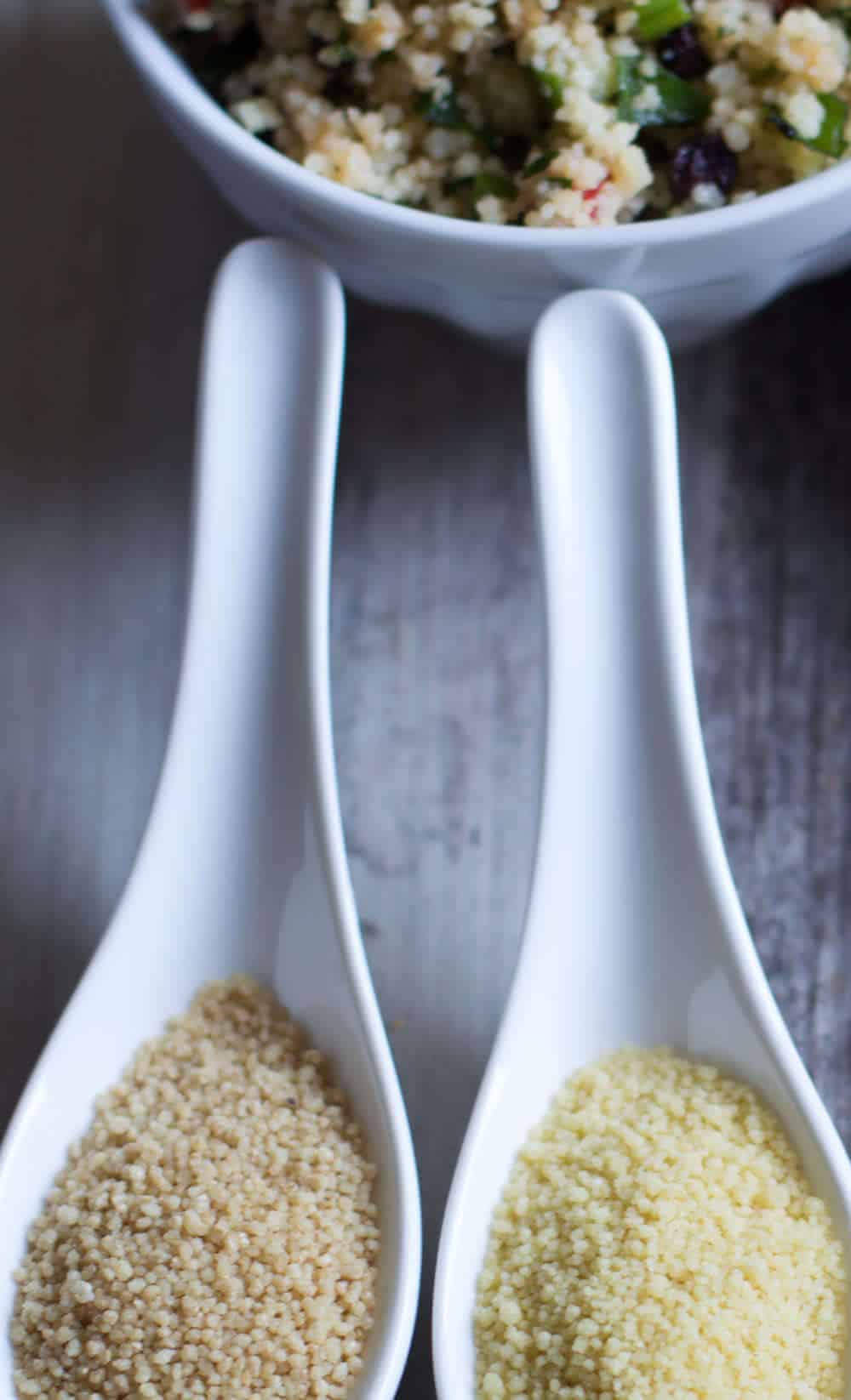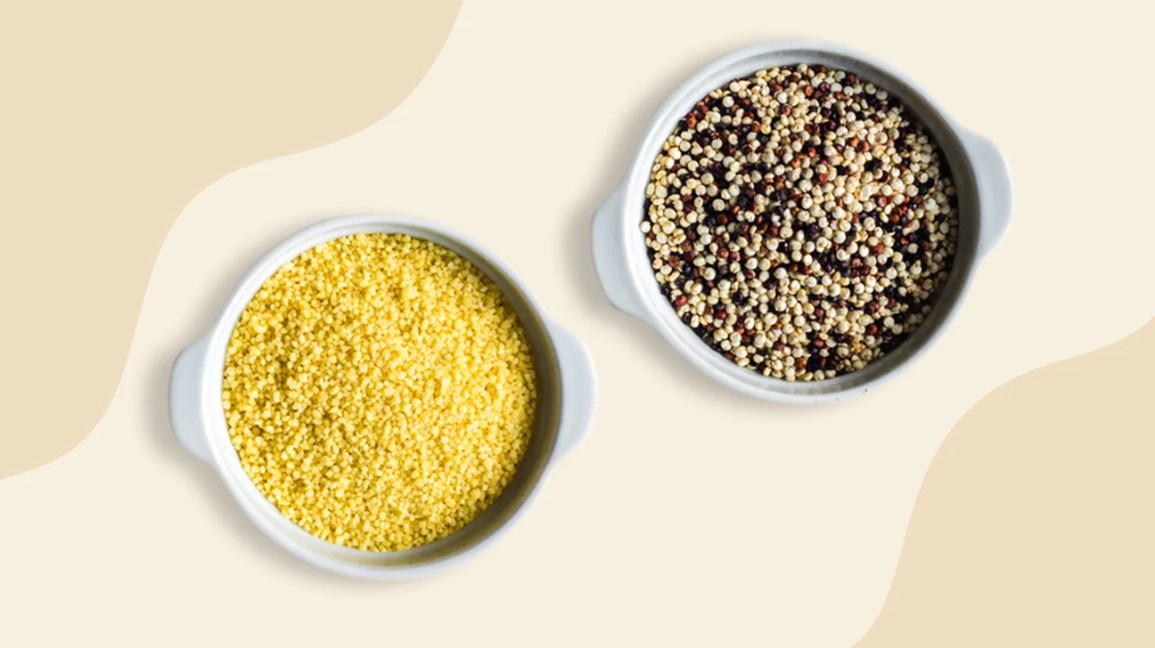Introduction

Grainy delights such as bulgur wheat and couscous have been staples in various cuisines for centuries. While these two grains may have similar origins, they differ greatly in terms of their nutritional value and cooking methods. This article aims to compare the nutritional profiles of bulgur wheat and couscous, highlighting their respective benefits and cooking methods. Whether you’re looking to enhance your digestive health or boost your cardiovascular well-being, understanding the differences between these grains can help you make informed choices in your diet. So let’s dive into the world of bulgur wheat vs. couscous and discover the grainy delight that suits your preferences and health goals.
What Is Bulgur Wheat?
Bulgur wheat is a whole grain that is made by partially boiling, drying, and then cracking wheat kernels. This process helps to retain the wheat’s nutrient-rich bran and germ layers, making bulgur a highly nutritious option. It has been a staple in Middle Eastern and Mediterranean cuisines for centuries, valued for its nutty flavor and chewy texture. Bulgur wheat is rich in fiber, protein, vitamins, and minerals, making it a great addition to a balanced diet. It is also known for its quick cooking time, making it a convenient choice for busy individuals. So, whether you’re looking to add more nutritional value to your meals or simply diversify your grain options, bulgur wheat is definitely worth a try.
What Is Couscous?
Couscous is a type of pasta made from semolina flour, which is derived from durum wheat. It is a staple in North African and Middle Eastern cuisines and has gained popularity worldwide due to its versatility and quick cooking time. Couscous has a light, fluffy texture and a mild, slightly nutty flavor. It can be used as a base for salads, served as a side dish with stews and curries, or even incorporated into desserts. Couscous is a great option for those looking for a convenient and easy-to-prepare grain alternative.
Nutritional Profile Of Bulgur Wheat
Bulgur wheat is a highly nutritious grain that offers an array of health benefits. It is rich in dietary fiber, providing about 8 grams per cup. This high fiber content can aid in digestion and promote feelings of fullness, making it a great choice for weight management. Additionally, bulgur wheat is a good source of vitamins and minerals such as iron, magnesium, and B vitamins. It also contains antioxidants that help protect the body against inflammation and chronic diseases. With its impressive nutritional profile, bulgur wheat is a great addition to a balanced and healthy diet.
Benefits Of Bulgur Wheat
Bulgur wheat offers a multitude of health benefits. Its high fiber content aids in digestion and promotes feelings of fullness, making it an excellent choice for weight management. The fiber also helps regulate blood sugar levels, reducing the risk of diabetes. Bulgur wheat is a good source of essential minerals like iron, which is crucial for transporting oxygen throughout the body, and magnesium, which supports bone health. Moreover, it contains B vitamins that play a vital role in energy production. With its impressive nutritional profile, incorporating bulgur wheat into your diet can contribute to overall health and well-being.
Cooking Methods For Bulgur Wheat
Bulgur wheat is a versatile grain that can be cooked in various ways to suit different dishes and flavors. One common method is boiling, similar to cooking rice. Simply bring water or broth to a boil, add the bulgur wheat, and simmer until tender. The ratio is typically one part bulgur wheat to two parts liquid. Another method is soaking, which requires less cooking time. Soak the bulgur wheat in hot water or broth for about 20-30 minutes until it absorbs the liquid and becomes soft. This method works well for salads and tabbouleh. Finally, you can also cook bulgur wheat in a rice cooker or use it as a filling in stuffed vegetables or as a substitute for rice in pilafs and risottos.
Nutritional Profile Of Couscous
Couscous is a type of pasta made from semolina, a coarse-ground wheat. It is commonly used in North African and Middle Eastern cuisines. In terms of nutrition, couscous is lower in calories compared to bulgur wheat. It is also a good source of carbohydrates, providing energy for the body. However, couscous is not as high in dietary fiber as bulgur wheat. It contains small amounts of essential minerals such as calcium, iron, and zinc. Overall, couscous can be a nutritious option as part of a balanced diet, especially when paired with other nutrient-rich ingredients.
Benefits Of Couscous
Couscous offers several health benefits that make it a nutritious addition to your diet. Firstly, it is a good source of complex carbohydrates, which provide long-lasting energy for the body. It is also low in fat and cholesterol, making it a heart-healthy choice. Additionally, couscous contains small amounts of essential minerals such as calcium, iron, and zinc, which support various bodily functions. Its mild flavor and versatility make it a versatile ingredient that can be easily incorporated into a variety of dishes. Whether enjoyed as a side dish or the base of a main course, couscous can contribute to a balanced and nutritious meal.
Cooking Methods For Couscous
Couscous is incredibly easy to cook, making it a versatile and convenient ingredient. To prepare couscous, simply bring water or broth to a boil, and then pour it over the couscous in a separate bowl. Cover the bowl with a lid or plate and let it sit for about 5 minutes, allowing the couscous to absorb the liquid. Afterward, fluff the couscous with a fork to separate the grains. Couscous can also be cooked using the absorption method, where it is simmered in liquid until tender. This method may take a bit longer, but it results in a slightly fluffier texture.
Nutritional Comparison

When it comes to a nutritional comparison between bulgur wheat and couscous, there are some notable differences. In terms of calories, bulgur wheat is slightly lower, with approximately 151 calories per cooked cup compared to couscous, which has around 176 calories per cup.
In terms of macronutrients, bulgur wheat is higher in fiber, with about 8 grams per cup compared to around 2 grams in couscous. Bulgur also contains more protein, with around 6 grams per cup compared to 6 grams in couscous.
When it comes to micronutrients, both grains offer some health benefits. Bulgur wheat is a great source of minerals like manganese, magnesium, and phosphorus, while couscous provides iron and selenium.
Overall, while couscous is a good source of carbohydrates and provides some essential nutrients, bulgur wheat offers more fiber and a wider range of minerals, making it the healthier choice.
Comparison Of Calories And Macronutrients
When comparing the calorie and macronutrient content of bulgur wheat and couscous, there are some notable differences. Bulgur wheat is slightly lower in calories, with approximately 151 calories per cooked cup compared to couscous, which has around 176 calories per cup. Both grains are primarily composed of carbohydrates, but bulgur wheat contains more fiber (8 grams per cup) compared to couscous (2 grams per cup). In terms of protein, bulgur wheat and couscous offer similar amounts, with around 6 grams per cup. These differences in calories and macronutrients make bulgur wheat a healthier choice in terms of overall nutritional value.
Micronutrient Content In Bulgur Wheat Vs Couscous
When comparing the micronutrient content of bulgur wheat and couscous, there are some notable differences. Bulgur wheat is a great source of several key vitamins and minerals. It is particularly rich in manganese, magnesium, and phosphorus. Additionally, bulgur wheat provides significant amounts of thiamin (vitamin B1) and niacin (vitamin B3). On the other hand, couscous tends to have lower levels of these micronutrients. While both grains can be a nutritious addition to your diet, bulgur wheat offers a slightly higher micronutrient profile. Adding bulgur wheat to your meals can help you meet your daily vitamin and mineral needs.
Health Benefits
Bulgur wheat and couscous both offer unique health benefits. Bulgur wheat, as a whole grain, is rich in fiber, which aids in digestion and helps maintain a healthy weight. It also contains several essential nutrients, such as manganese, magnesium, and phosphorus, which support bone health and overall well-being. Couscous, on the other hand, is a good source of selenium and vitamin E, which have antioxidant properties and support immune function. Adding either grain to your diet can contribute to a well-rounded and nutritious meal plan.
Digestive Health Benefits Of Bulgur Wheat
Bulgur wheat offers numerous digestive health benefits. As a whole grain, bulgur is rich in dietary fiber, which aids in digestion and helps prevent constipation. The high fiber content also promotes a feeling of fullness, which can aid in weight management. Additionally, bulgur wheat contains resistant starch, which acts as a prebiotic and supports the growth of beneficial gut bacteria. These bacteria play a crucial role in maintaining a healthy digestive system and can improve overall gut health. Adding bulgur wheat to your diet can help ensure a healthy and efficient digestion process.
Cardiovascular Health Benefits Of Couscous
Couscous contributes to cardiovascular health due to its nutrient profile. It is low in fat and cholesterol, making it heart-friendly. Additionally, couscous is a good source of complex carbohydrates and dietary fiber, both of which can help lower the risk of heart disease. The fiber content in couscous aids in reducing LDL cholesterol levels and maintaining healthy blood pressure. It is also rich in selenium and vitamin E, which have antioxidant properties that protect against oxidative stress and inflammation, contributing to a healthier cardiovascular system. Incorporating couscous into your diet can support heart health and promote overall well-being.
Conclusion
In conclusion, when comparing the nutritional profiles of bulgur wheat and couscous, it is clear that both grains offer unique benefits. Bulgur wheat, as a whole grain, is rich in dietary fiber, promoting digestive health. On the other hand, couscous is low in fat and cholesterol, making it heart-friendly and supporting cardiovascular health. Ultimately, the choice between bulgur wheat and couscous depends on individual dietary needs and preferences. Incorporating both grains into a balanced diet can provide a variety of nutrients and contribute to overall well-being. Explore different recipes and serving suggestions to enjoy the versatile and nutritious qualities of both bulgur wheat and couscous.
Choosing Between Bulgur Wheat And Couscous
When it comes to choosing between bulgur wheat and couscous, it ultimately depends on individual dietary needs and preferences. Bulgur wheat, with its rich fiber content, is an excellent choice for those looking to support digestive health. On the other hand, couscous is low in fat and cholesterol, making it a heart-friendly option. Consider incorporating both grains into your diet to enjoy their unique benefits. Whether you’re looking for a nutty, chewy texture or a light and fluffy option, both bulgur wheat and couscous can add variety and nutrition to your meals. Explore different recipes and serving suggestions to discover which grain you prefer.
Recipes And Serving Suggestions
Incorporating both bulgur wheat and couscous into your meals is a great way to add variety and nutrition to your diet. Here are a few recipes and serving suggestions to inspire you:
- Bulgur Salad: Combine cooked bulgur wheat with chopped vegetables like tomatoes, cucumbers, and red onions. Dress it with lemon juice, olive oil, and a sprinkle of fresh herbs like parsley or mint. Serve it as a refreshing side dish or a light lunch.
- Couscous Stir-fry: Cook couscous according to package instructions and set aside. In a pan, sauté your favorite vegetables like bell peppers, broccoli, and carrots. Add the cooked couscous and season with soy sauce or your choice of spices. Enjoy a flavorful and quick stir-fry.
- Stuffed Bell Peppers with Bulgur: Cut the tops off bell peppers and remove the seeds. Cook bulgur wheat and mix it with cooked ground meat, diced tomatoes, and herbs. Stuff the bell peppers with the mixture and bake until tender. Serve as a wholesome and satisfying main course.
- Mediterranean Couscous Bowl: Prepare couscous and top it with grilled chicken or roasted chickpeas, a variety of roasted vegetables like eggplant and zucchini, and a dollop of tzatziki sauce. This colorful bowl is a complete meal bursting with Mediterranean flavors.
Remember to get creative in the kitchen and explore different flavor combinations and ingredients to find your favorite way to enjoy bulgur wheat and couscous.
FAQ About Grainy Delights: Bulgur Wheat Vs Couscous: A Nutritional Comparison
Q: What is Bulgur Wheat?
A: Bulgur wheat is a whole grain made from cracked wheat that has been partially cooked.
Q: What is Couscous?
A: Couscous is a type of small steamed or soaked semolina granules typically served as a staple food in many North African cuisines.
Q: How do Bulgur Wheat and Couscous differ nutritionally?
A: Bulgur wheat is higher in fiber, protein, and nutrients like iron and magnesium compared to couscous. Couscous, on the other hand, is lower in calories and carbohydrates.
Q: Which one is better for weight management?
A: Due to its higher fiber content and lower glycemic index, bulgur wheat is generally considered more filling and beneficial for weight management compared to couscous.
Q: Can both Bulgur Wheat and Couscous be included in a balanced diet?
A: Yes, both bulgur wheat and couscous can be part of a balanced diet when consumed in moderation and paired with other nutrient-dense foods.
Q: Are there any gluten concerns with Bulgur Wheat and Couscous?
A: Bulgur wheat is not gluten-free as it is a product of wheat, while traditional couscous is made from semolina, which is also not gluten-free. However, gluten-free versions of both bulgur wheat and couscous are available for those following a gluten-free diet.
Q: How can Bulgur Wheat and Couscous be incorporated into recipes?
A: Bulgur wheat can be used in salads, pilafs, and soups, while couscous is commonly used as a base for stews, curries, and salads. Both grains can be versatile additions to a variety of dishes.

The Finer Diner has a rich history deeply rooted in the Mt. Oliver and Hilltop community. Our journey began with a simple yet ambitious vision – to create a welcoming space where friends and families could come together to enjoy delicious, comforting meals in a classic diner-style setting. Since our establishment, we have been dedicated to serving food, creating lasting memories, and fostering a sense of belonging within our community. Our commitment to quality, authenticity, and exceptional service has been the cornerstone of our success.